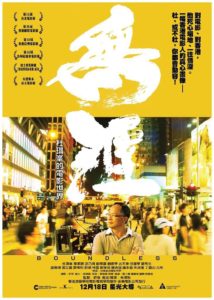Boundless
无涯 杜琪峰的电影世界
Hong Kong, 2013, colour, 16:9, 94 mins.
Rating: 8/10.
Director: Lin Zeqiu 林泽秋.
Engrossing portrait of Du Qifeng [Johnnie To] that comes close to the film-maker’s heart and soul.
Portrait of the career of Hong Kong director-producer Du Qifeng 杜琪峰 [Johnnie To] (b. 1955), from the time of setting up his own company Milkyway Image 银河映像(香港) in 1996 to making Blind Detective 盲探 in 2012, and including interviews with colleagues.
REVIEW
From its opening sequence, showing him bawling out his Mainland crew during the shoot of Romancing in Thin Air II 高海拔之恋II (2012), to quieter one-on-one interviews back home in Hong Kong, Boundless 无涯 杜琪峰的电影世界 gets very close to the heart and soul of prolific director-producer Du Qifeng 杜琪峰 [Johnnie To] – and certainly in a more comprehensive way than in French documentarian Yves Montmayeur’s hour-long Johnnie Got His Gun! (2010), which saw only a gifted maker of crime-action movies. Mainland-born director Lin Zeqiu 林泽秋 followed Du around for two years, during the production of Romancing and Drug War 毒战 (2012) in China and Blind Detective 盲探 (2013) in Hong Kong, and the result, refreshingly, is first a personal portrait of Du as a working director and only second a critical analysis of his movies. (The only critic interviewed is veteran Shu Qi 舒琪 [Shu Kei], who produced the documentary.) Though more suitable for viewers who already know Du’s films, it’s still an engrossing 90-or-so minutes.
Avoiding a regular biographical approach – there are no details of Du’s life, nor any mention of his TV work or movies prior to setting up his own production house, Milkyway Image 银河映像(香港), in 1996 – Boundless is instead driven by a wide array of themes: Du’s uneasy relationship with Mainland China and its industry, his feelings (both positive and negative) on his native Hong Kong, his support for a re-birth of its troubled industry, his way of working with his regular team, and his contention that after 30-odd years he’s still learning how to make films. With clips from a dozen movies, and interviews with almost 20 collaborators, it’s a dense but well-paced study of a professional who’s spent his whole career in the business and is still, modestly, open to new ideas and the industry’s constant evolution.
The film is frank about Du’s long disregard for co-productions with the Mainland, where he shot his first movie, costume martial arts drama The Enigmatic Case 碧水寒山夺命金 (1980), but which he then studiously ignored for 30 years until finally deciding to try the market with Romancing and Drug War. Those tough shoots (detailed here in unvarnished production footage) seem to have shored up his belief that the Hong Kong industry’s long-term revival depends not on co-productions with its giant neighbour but in re-strengthening its own distinct culture, partly through the Arts Development Council’s “Fresh Wave” 鲜浪潮 programme in which he was involved for nine years.
An instinctive democrat who gets angry at any government’s inability to listen to its people, Du sees film-making as a “weapon” but, apart from occasional films like Election 2 黑社会 以和为贵 (2006), rarely uses it in an overtly political way. Time and again, the documentary shows him as a professional craftsman, a nuts-and-bolts man, who favours a co-operative system and gets extreme loyalty from his professional family when necessary – not least during Milkyway’s early days, when the local industry was on the verge of collapse and there was hardly a cent in the company’s coffers. That loyalty saw him through the now-legendary The Mission 枪火 (1999, made in Milkyway’s darkest period, and with no completed script) and also Exiled 放•逐 (2006, made with no script and no idea where it was going). Du is not only used to flying rudderless but also, clearly, can get inspiration from it as well.
These and other anecdotes keep Boundless very watchable and focused on the man himself. More detail would have been welcome about long-in-the-works Sparrow 文雀 (2008, one of his most personal love letters to a vanished Hong Kong) and anything at all about the seminal The Longest Nite 暗花 (1998, which isn’t even mentioned). But in general the documentary covers the waterfront in its freely-ranging way and, most importantly, shows what makes one of Hong Kong’s hardest working film-makers tick.
The film, whose Chinese title translates as “No Limits: The Film World of Du Qifeng [Johnnie To]”, was Lin’s graduation thesis work at Hong Kong’s School of Film & Television. He previously made the shorts The Darkness 孽夜 (2006) and Hope in Summer 夏夜的风 (2010). The English subtitles could be improved.
CREDITS
Presented by The Hong Kong Academy for Performing Arts School of Film & Television (HK). Producer: Shu Qi [Shu Kei].
Script: Lin Zeqiu. Photography: Xu Ke. Editing: Lin Zeqiu. Music: Zhao Lijie, Yang Bingyin, Yan Qing, Zou Yaozu. Sound: Vincent Fung.
With: Du Qifeng [Johnnie To], Jia Zhangke, Zhu Shuyi [Elaine Chu], Wei Jiahui [Wai Ka-fai], You Naihai [Yau Nai-hoi], Liu Qingyun [Lau Ching-wan], Zheng Zhaoqiang [Cheng Siu-keung], Yuan Bin, Luo Yongchang [Law Wing-cheong], Lin Xue [Lam Suet], Ren Dahua [Simon Yam], Ding Yunshan, Shu Qi [Shu Kei], Zheng Baorui [Soi Cheang], Zhang Aijia [Sylvia Chang], Zheng Xiuwen [Sammi Cheng], Liu Dehua [Andy Lau], Shao Meiqi [Maggie Shiu], Gu Tianle [Louis Koo].
Premiere: Hong Kong Asian Film Festival (HK First), 2 Nov 2013.
Release: China, 8 Dec 2014.
(Review originally published on Film Business Asia, 7 Mar 2014.)
